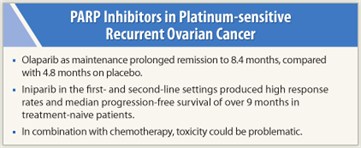Novel agents produced high response rates and prolonged remissions in patients with platinum-sensitive recurrent ovarian cancer, in studies reported at the 2011 ASCO Annual Meeting.
In an international randomized phase II trial, maintenance therapy with the oral poly [ADP-ribose] polymerase (PARP) inhibitor olaparib extended disease-free survival by 4 months, according to Jonathan Ledermann, MD, of University College London in the United Kingdom.1
“Olaparib significantly prolonged progression-free survival by nearly 4 months on average, compared with placebo. This is the first study to demonstrate a statistically significant benefit of maintenance treatment for platinum-sensitive relapsed serous ovarian cancer,” Dr. Ledermann said. “It shows proof of principle for the concept of maintenance therapy in ovarian cancer using a PARP inhibitor.”
At the time of analysis, 50% of the olaparib-treated patients, compared with just 16% of the placebo subjects, were still on treatment.
Underlying Mechanism
PARP is a key regulator of DNA damage response and helps repair single-strand breaks. In normal cells, homologous recombination repair is also engaged in repairing damage. Cells with impaired homologous repair cannot repair themselves, which leads to chromosomal instability and cell death. Up to 50% of high-grade serous ovarian cancer patients could be deficient in homologous repair, Dr. Ledermann explained.
 “We think platinum-sensitive serous ovarian cancer may be a good indicator of homologous repair deficiency, and we tested this,” he said.
“We think platinum-sensitive serous ovarian cancer may be a good indicator of homologous repair deficiency, and we tested this,” he said.
The phase II trial randomly assigned 265 patients with platinum-sensitive relapsed serous ovarian cancer to daily oral olaparib as maintenance or to placebo; all patients had responded to at least two previous platinum regimens for recurrence.
Disease progression was observed in 44% of the olaparib arm vs 72% of the placebo arm; median progression-free survival was 8.4 vs 4.8 months, respectively, for a relative risk reduction of 65% that was highly significant (P < .00001) and that was consistent across all subgroups, Dr. Ledermann reported.
“Our progression-free survival difference was very impressive and better than we anticipated,” he commented. Outcomes within the BRCA-mutated subset (22% with known mutations) were similar to those for the entire group, he added. The overall survival analysis is not yet mature.
“Olaparib was well tolerated, though there was an increase in three side effects,” he acknowledged. These included nausea (68% vs 35%), fatigue (49% vs 38%), and vomiting (32% vs 14%).
“In a population enriched for homologous recombination repair deficiency, our results suggest that olaparib may have an important role to play in the future management of serous ovarian cancer,” Dr. Ledermann concluded.
Iniparib Shows Strong Activity
Two studies evaluating iniparib in combination with gemcitabine/carboplatin were promising as well. Iniparib induces cell-cycle arrest as a single agent and potentiates cell-cycle arrest by DNA-damaging agents but is a weak inhibitor of PARP.
Richard Penson, MD, of Massachusetts General Hospital, Boston, presented the phase II trial of iniparib in 41 platinum-sensitive patients without prior treatment for recurrence.2 The overall response rate was 65%, and responses were seen in both the BRCA mutant (approximately 50% of the population) and wild-type cohorts. Median progression-free survival was 9.5 months. As of May 2011, 17 of 41 patients remained on treatment without progression, he reported.
In a separate phase II study of first-line therapy in platinum-resistant patients, 8 of 32 patients responded (25%), and 26 (81%) derived clinical benefit from iniparib, according to Michael Birrer, MD, PhD, also of Massachusetts General Hospital.3
Serious adverse events believed to be related to iniparib were noted in 12% of the first-line patients and 26% of the second-line patients, most commonly thrombocytopenia, neutropenia, anemia, nausea, vomiting, small intestinal obstruction, fatigue, dehydration, and hypokalemia. ■
Financial Disclosure: Drs. Birrer, Benson, and Ledermann reported no potential conflicts of interest.
References
1. Ledermann JA, Harter P, Gourley C, et al: Phase II randomized placebo-controlled study of olaparib (AZD2281) in patients with platinum-sensitive relapsed serous ovarian cancer. 2011 ASCO Annual Meeting. Abstract 5003. Presented June 4, 2011.
2. Penson RT, Whalen C, Lasonde B, et al: A phase II trial of iniparib (BSI-201) in combination with gemcitabine/carboplatin in patients with platinum—sensitive recurrent ovarian cancer. 2011 ASCO Annual Meeting. Abstract 5004. Presented June 4, 2011.
3. Birrer MJ, Konstantinopoulos P, Penson RT, et al: A phase II trial of iniparib in combination with gemcitabine/carboplatin in patients with platinum-resistant recurrent ovarian cancer. 2011 ASCO Annual Meeting. Abstract 5005. Presented June 4, 2011.

 Stanley B. Kaye, MD, of Royal Marsden Hospital in London, the invited discussant, commented, “The trial of olaparib was important, showing clear superiority of olaparib with an impressive hazard ratio that was not restricted to BRCA-mutated patients.…There is a role for taking this drug forward as...
Stanley B. Kaye, MD, of Royal Marsden Hospital in London, the invited discussant, commented, “The trial of olaparib was important, showing clear superiority of olaparib with an impressive hazard ratio that was not restricted to BRCA-mutated patients.…There is a role for taking this drug forward as...